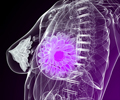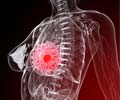- The American Heart Association states that breast cancer is a risk for cardiovascular disease.
- It also states that current breast cancer treatments can have negative effects on the heart.
- It urges patients to consider heart health while opting between therapies.
Breast cancer may increase the risk for cardiovascular diseases including heart failure. The American Heart Association releases a scientific statement that explains the association between breast cancer and cardiovascular health. It also states in the statement that breast cancer treatment can affect the heart, and suggests a treatment approach that weighs the benefits of specific therapies against potential damage to the heart.
Emphasis on heart health while opting for breast cancer treatments
"Any patient who is going to undergo breast cancer treatment, whether they have heart disease at the beginning or not, should be aware of the potential effects of the treatments on their heart," said Laxmi Mehta, M.D., chair of the writing group for the new scientific statement. "This should not deter or scare patients from undergoing breast cancer treatment, but should allow them to make informed decisions with their doctor on the best cancer treatment for them."
“During cancer treatments, patients should pay attention not only to their breast health, but also to their general health, including their heart”, said Dr. Mehta, who is director of the Women's Cardiovascular Health Program and an associate professor of medicine at The Ohio State University in Columbus, Ohio.
For example, some cancer treatments, such as HER-2 targeted therapies, can cause weakening of the heart muscle, a condition known as heart failure. HER-2 is a specific type of breast cancer. In some cases, the reduction in heart function is temporary and cessation of the treatment and/or the addition of heart medicines can improve function. But in some breast cancer patients, heart failure can be permanent. Because of this, the early development of heart failure can signal a need to slow down and/or alter a patient's breast cancer treatment because of the risk for worsening the condition or the development of permanent heart failure.
Some small studies suggest that administering common chemotherapy agents in new ways may reduce heart disease risks. Doxorubicin is a chemotherapy drug used in breast cancer therapy that can lead to the damage of heart cells. Studies have shown that when doxorubicin is administered slowly, rather than all at once, patients may have a lower risk of heart failure.
Other treatments, such as radiation, can affect the heart arteries and cause the development of coronary artery disease or blockages. Some breast cancer treatment agents, such as anthracyclines, can result in abnormal heart rhythms that in some patients are benign but in others can lead to life-threatening heart rhythms. And, some treatments, like antimetabolites, can cause spasm of the heart arteries, which can cause chest pain symptoms but could lead to heart attacks as well.
Heart disease and breast cancer share a number of risk factors, including advanced age, poor diet, family history, physical inactivity and tobacco use. The fact that these diseases share some risk factors suggests that there are lifestyle choices, primarily diet and exercise, that could help decrease the risks of developing both diseases. Healthcare providers should monitor a woman's heart health before, during and after breast cancer treatment.
Adherence to a number of ideal heart health behaviors or factors from the American Heart Association's' Life's Simple 7 is associated with a trend towards a lower incidence of breast cancer. Life's Simple 7 includes being physically active, achieving and maintaining a healthy body weight, eating a healthy diet, avoiding tobacco, maintaining healthy levels of blood pressure, cholesterol and blood sugar.
"Fortunately, with the advances in breast cancer treatment, there has been a growing number of survivors. However, during and after the treatment of breast cancer, having optimal control of heart disease risk factors is important, because older breast cancer survivors are more likely to die of heart disease than breast cancer," Dr. Mehta said. "And that's why Life's Simple 7 is important for all patients with and without breast cancer."
Although there are an estimated 47.8 million women in the U.S. who are living with cardiovascular diseases and approximately 3 million breast cancer survivors, many people regard breast cancer as the primary threat to women's health. It is important to recognize the overlap of heart disease and breast cancer as both entities impact survival.
References:
- Laxmi S. Mehta, Karol E. Watson et al. Cardiovascular Disease and Breast Cancer: Where These Entities Intersect: A Scientific Statement From the American Heart Association, Circulation https://doi.org/10.1161/CIR.0000000000000556
Source-Eurekalert
















